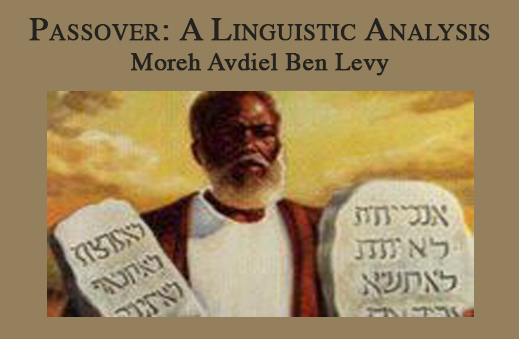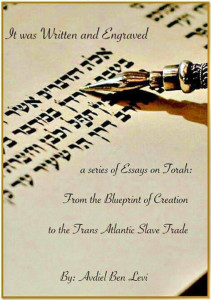Passover: A Linguistic Analysis
by
Moreh Avdiel Ben Levi
The season of Passover represents so many facets of truth and spiritual empowerment within Torah. It is one of the greatest of our Holy seasons in that it affords us a panoramic view of what it means to be spiritually free. Passover or Pesach פסח in Hebrew literally means to skip over, or to pass over. It’s cognate meaning (linguistic relative) is what yields much depth about what this Holy season truly means to us.
Passover or pesach פסח is linguistically related (cognate meaning) to the Hebrew word patzah פצה, which literally means to Open (Genesis:4:11פצתה), as well as Freeing or Rescuing (Psalms:144:10 הפוצה). It’s also related to the Hebrew word Patzach פצח, which literally means in Hebrew to Break (Micah:3:3 פצחו) and to Burst forth (Isaiah:54:1 פצחי). These linguistic roots give us greater insight and depth into the very language the Torah employs to describe the Passover events and the Passover season.
We are taught that we do not eat leavened bread (yeast/leavening agents) during the season of Passover because we left the land of Egypt in “haste” and hence did not have time to wait for our bread to rise (Exodus:12:33-34). Yet, after assessing the above phonetic cognate (related) roots for the Word for Passover in Hebrew which is Pesach פסח, we see that their may actually be more to the story.
Yeast in Hebrew is called Kametz חמץ. Kametz חמץ in Hebrew literally means to ferment or sour (Exodus:12:20) as well as to do Violence to (Psalms:71:4 וחומץ). It’s cognate (related) meaning however is found in the Hebrew word Kamas חמס, which literally means to victimize, to do wrong to (Genesis:16:5 חמסי) or to scatter (Job:15:33 יחמוס). With the above definitions in place we can begin to unravel the full depth and meaning of Passover and exactly why we don’t eat any leavening agents.
You see, we were once slaves in Ancient Egypt. Our slavery began with an arrogant ruler who decided that we are too numerous and powerful as a United people. So he set in motion a series of acts which would destroy our unity and scatter – Kamas חמס – divide and break – Patzach פצח – our strength. Hence the Torah tells us that one of the reasons that we are to refrain from eating leavening agents – Kametz חמץ – is because with a STRONG hand Hashem brought us up out of the land of Egypt, as it is written: “for with a Strong hand Hashem has brought you out of the land of Egypt and therefore Kametz חמץ – Leavening agents – may not be eaten” (Exodus:13:3). Thus, the Creator essentially guided us out of Egypt in “haste”, because the very element which causes bread to rise.(yeast or Kametz), is synonymous with Violence חמץ and victimizing חמס. Yet the Creator is redeeming us from Egypt to give us His Torah, which represents spiritual freedom, thus we are No longer victims of the tyranny of Egypt and hence the symbolic meaning of refraining or abstaining from leavening agents is to let us know that we are No longer going to suffer at the hands of another, so long as our Trust and Allegiance is to Hashem through His Torah.
With all of the above in mind, I can now understand the words of the sages, who in commenting on Exodus:32:16, in reference to the Ten commandments being engraved in stone, the Hebrew word for Engraved which is חרות Karut, said: “don’t read it as Engraved (Karut), but read it as K(e)ruth (Avot: 6:2), which means FREEDOM – for it is the Torah which enables Man to be genuinely Free, giving him the ability to transcend his nature and soar much higher than even the Angels on high, for the Torah is our source of Spiritual Liberation, which without it the very spirit is without animation and hence life!
* Moreh Avdiel Ben Levi is a Hebrew scholar and the author of It was Written and Engraved: A Series of Essays on Torah.



We invite our readers to share their views and create a conversation about the material contained in this article.
Great article ahki.. It’s good to see a much deeper understanding of Pesach, and why we have to get rid of the leaven in our homes. Keep the articles and books coming!!!
B”H.
Thank you very much achi @Yaaziel Baruk. I genuinely appreciate your feedback and I’m humbled and honored that you found my article enlightening and empowering, May Hashem continue to Bless us all and may you and your family have a Blessed and gracious Pesach.
Very informative and straight to the point!
B”H
May we all learn to dig deeper with understanding our history, language, and culture.
By doing this we will preserve and sustain generations to come…. with righteousness and knowledge being that beacon of light for our brothers and sisters and the world at large.
We all have work to do. Lets get to it. BE”H